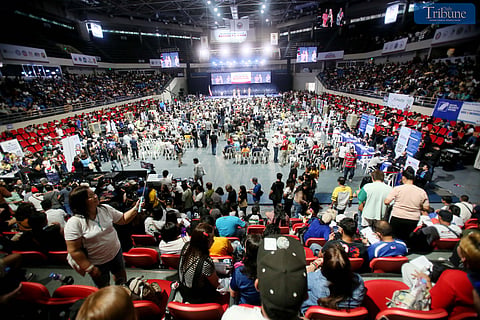
- NEWS
- the EDIT
- COMMENTARY
- BUSINESS
- LIFE
- SHOW
- ACTION
- GLOBAL GOALS
- SNAPS
- DYARYO TIRADA
- MORE

The Philippines, through the Department of Labor and Employment (DOLE), has partnered with the Human Resource Development (HRD) Corp. of the Malaysian Ministry of Human Resources to explore future training partnerships for the benefit of the Filipino workforce.
HRD Corp. Chief Strategy Officer Dr. Rony Ambrose Gobilee, Deputy Chief of Mission Norjufri Nizar Edrus from the Malaysian Embassy in the Philippines, and International Business Unit Executive Muhammad Haziq Adil bin Abd Wahid discussed the upcoming ASEAN Year of Skills (AYOS) 2025, which will be hosted by Malaysia in partnership with the International Labour Organization. The event aims to help workers acquire future-ready skills.
According to DOLE, the forum aims to close skills gaps, promote fair job opportunities, and strengthen partnerships among ASEAN countries.
“Let me express, on behalf of our Secretary, our strong support for Malaysia's leadership and hosting of the ASEAN Year of Skills 2025, including all the initiatives under this implementation aimed at enhancing workforce capabilities, which are, of course, all geared towards the progress of our region,” DOLE Assistant Secretary Amuerfina Reyes said.
“We also acknowledge the role of our HRD Corporation in advancing workforce development,” Reyes added.
The two countries also discussed possible collaborations for Malaysia’s National Training Week (NTW), which will be held in June, and the National Human Capital Conference and Exhibition (NHCCE) in October.
These major events focus on upskilling workers, talent mobility, and stronger ASEAN cooperation to ensure that the ASEAN workforce remains competitive in the job market.
The NTW is an annual nationwide event funded through Malaysia’s levy system, offering free training programs across various fields to enhance the workforce's skills.
Meanwhile, this year’s NHCCE will continue to highlight challenges in human capital development and the evolving needs of industries.
DOLE also mentioned possible areas of cooperation, such as capacity-building and exchange program initiatives, technical and vocational education and training, digital skills training, and technology-driven upskilling programs.
The two countries aim to improve labor and employment initiatives, which could provide Filipino workers with better training, career growth, and more job opportunities in an evolving labor market, thereby contributing to ASEAN’s regional growth.
